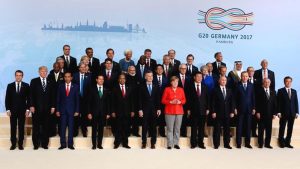 So, I was struck almost immediately by the headline in the Atlantic blog on the Hamburg G20. It turns out that the post was by my good friend Tom Wright from Brookings. The headline – “The G20 is Obsolete”. Just as I thought but so soon after Hamburg!
So, I was struck almost immediately by the headline in the Atlantic blog on the Hamburg G20. It turns out that the post was by my good friend Tom Wright from Brookings. The headline – “The G20 is Obsolete”. Just as I thought but so soon after Hamburg!
Tom’s defense – when I caught him – he didn’t write the headline, which I suspect is perfectly true – but really. At least a protest!
My only immediate reposte -“you had better hope not” that is at least with respect to the conclusion. Now, Tom generally edges to the realist side when examining the liberal internationalist order, but I was surprised by the vehemence. Take this line:
But the divisions in the G20 run far deeper than frustration with Trump: The body itself is a vestige of a world that no long exists.
Whoa. That’s strong!
Now Tom’s conclusion is drawn from the view that the G20 was constructed on a presumption that, “all major powers were converging around a single model of liberal international order.” Now here, in my opinion, Tom rather conflates global governance and the Liberal Order. What we have come to understand is that there was a view – certainly from the US – but others as well that the liberal international order participants were all liberalizing – becoming democracies just like us. As he said: “Over time, they would liberalize their political and economic systems, even if some fell short of fully fledged liberal democracy.” Whether all G20 countries believed this, certainly the Chinese didn’t; nor increasingly did the Russians. What was presumed was that these states would further the global collaborative effort to meet key challenges – which up until 2008 were economic and financial -since the G20 was made up of foreign ministers and central bankers.
And it is also true that geopolitics has reemerged in a more persistent fashion with Russian -EU-US tensions and US-China tensions, just to name a few. And even the collaborative features of G7 and G20 were easily overblown. There have been constant journalistic claims that the G7, for example, the predecessor leadership forum was built on the likeminded engagement of the major states. They were all rich liberal democratic states. But that view too was easily exaggerated. These countries frequently quarrelled and fell into disagreement.Collaboration was difficult and disputes frequent. Progress was slow.
So the G20 was never solely built on a foundation of liberalizing states – at least politically; and most never presumed collaboration would be easily achieved. It well may be that Tom is right and that the G20 leaders accept that: “Trump’s election confirmed that the era of convergence is at an end. Now, the world is trying to figure out just how weak or resilient the international order is.”
So it well may be as Tom suggests that:
Over the next five years, the character and tempo of this new era of strategic competition will come into focus. … we will see nations compete with all measures short of war to achieve their objectives, including economic tools like sanctions, tariffs, and trade agreements; cyberwarfare of the type pioneered by Russia and China; proxy wars like the Syrian civil war; formal and informal alliances; coercive diplomacy; and soft power. The fact that the world is interconnected makes many of these weapons even more effective than they would otherwise be.
What we have, according to Tom, is a world divided into three parts – the Restorationists – or those leaders that want to return to – as the Canadian Prime Minister Justin Trudeau declared soon after being elected – calling on an earlier Prime Minister – return to “sunny ways”. Let’s get globalization and the Liberal Order back on track. Then there are the Revisionists – the anti-globalizers which seem to include the “spheres of influence” major powers – Russia and China, and then, finally, the Populists – national internationalists led by Donald Trump and other severe nationalists.
So is there geopolitical friction? You bet. Are there factions that are anti-globalizers, yup and there are the Trump-type nationalists. Can the global governance system go off the edge, it is certainly possible. As Tom rather more moderately concludes : “The world’s largest nations still need to cooperate but it will be much more difficult than before. Events in Hamburg were just a taste of what is yet to come.”
But I would suggest that these camps, real or not, only make the G20 leadership efforts even more important going forward. As I suggested in the previous post here at Rising BRICSAM, we have entered an era where leadership debate and disputation at the G20 and elsewhere is likely to be the rule at the G20 – Tom sees that as well.
Is G20 leadership over – i don’t think so. And while the bureaucratic and incremental function of the G20 – the so-called steering committee function, may well grind even more slowly in the face of differences, the leadership meeting will likely become even more important to global governance over the next while.
And I am willing to bet that if a crisis, a financial one in particular, were to suddenly ‘flair up’ you know where countries would look to to avoid the worst consequences of such a serious economic outcome.
Image Credit: youtube.com

